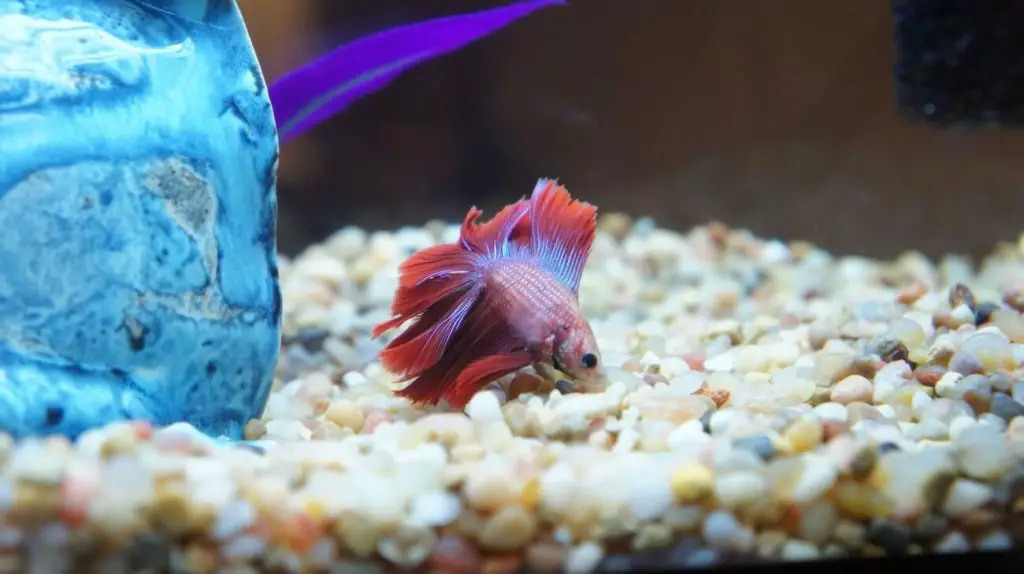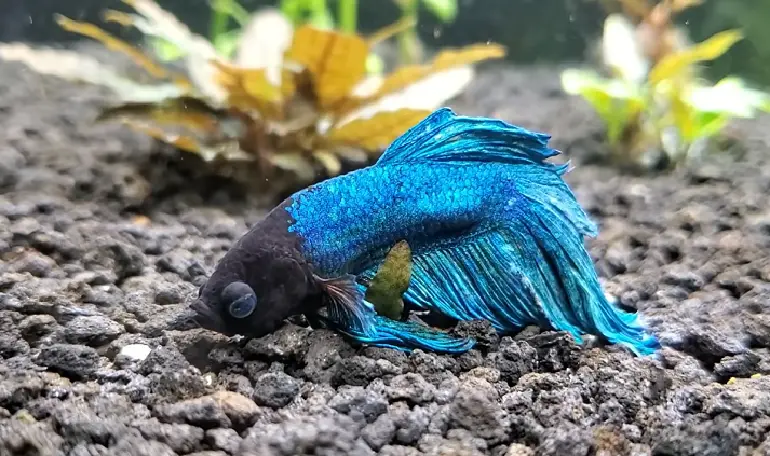Betta fish, also known as Siamese fighting fish, are popular pets for their vibrant colors and unique personalities. However, as a Betta fish owner, you may have noticed your fish occasionally lying on the bottom of its tank. This behavior can be concerning, especially if you’re not sure why it’s happening.
There are several reasons why Betta fish may lay on the bottom of their tank, ranging from natural behaviors to health issues. In this article, we will explore the various causes of Betta fish laying on the bottom and provide tips on how to identify and address the underlying problem.
Betta fish laying on the bottom of the tank could be a sign of stress, illness, or even old age. In order to determine the cause, observe the fish’s behavior and check the water quality. Test for ammonia, nitrite, nitrate levels and ensure that the temperature and pH levels are appropriate. A water change may also be necessary. If symptoms persist, consult a veterinarian or a fish expert for further advice.

Why is Betta Fish Laying on Bottom?
If you are a Betta fish owner, you may have noticed your fish laying on the bottom of the aquarium. This behavior can be concerning, as it is not normal for a Betta fish to spend extended periods of time at the bottom of the tank. In this article, we will explore the possible reasons why your Betta fish may be laying on the bottom of the tank and what you can do to help.
Water Quality
The most common reason for Betta fish laying on the bottom of the tank is poor water quality. Betta fish require clean and well-oxygenated water to thrive. If the water in the tank is dirty, it can lead to stress and illness in your fish. This stress can cause your Betta to become lethargic and lay on the bottom of the tank.
To maintain proper water quality, it is essential to perform regular water changes. Betta fish require a tank with a filter, and the filter should be cleaned regularly. You can also use a water testing kit to check the water’s parameters, such as pH levels, ammonia, and nitrate levels.
Temperature
Another reason why your Betta fish may be laying on the bottom of the tank is due to temperature fluctuations. Betta fish are tropical fish and require a warm environment to thrive. If the temperature in the tank drops too low, your Betta may become lethargic and lay on the bottom of the tank.
The ideal temperature for Betta fish is between 78-80 degrees Fahrenheit. You can use a heater to maintain a consistent temperature in the tank. It is essential to monitor the temperature regularly to ensure it stays within the appropriate range.
Disease
If poor water quality and temperature fluctuations are not the cause of your Betta fish laying on the bottom of the tank, it may be due to illness or disease. Betta fish are susceptible to a variety of diseases, and some of the symptoms include lethargy, loss of appetite, and laying on the bottom of the tank.
If you suspect your Betta fish is ill, it is essential to isolate them in a separate tank and seek advice from a veterinarian. Some common Betta fish diseases include fin rot, ich, and velvet.
Overfeeding
Overfeeding your Betta fish can also lead to them laying on the bottom of the tank. Betta fish have small stomachs and do not require large amounts of food. If you overfeed your Betta, it can lead to constipation and lethargy.
It is recommended to feed your Betta fish small amounts of food twice a day. You can use a Betta-specific food or offer them live or frozen foods, such as bloodworms or brine shrimp.
Stress
Stress can also cause your Betta fish to lay on the bottom of the tank. Stress can be caused by a variety of factors, such as a change in environment, bullying from other fish, or bright lighting.
To reduce stress, ensure that your Betta fish has plenty of hiding places in the tank, such as plants or decorations. You may also want to reduce the lighting in the tank and avoid adding new fish to the tank unless necessary.
Benefits of Betta Fish
Betta fish are popular pets due to their striking colors and unique personalities. They are relatively easy to care for and require minimal space. Betta fish are also known for their ability to interact with their owners and can recognize them.
Betta fish can also have a calming effect on people and can reduce stress levels. They are a great addition to any home or office and can be an excellent choice for a first-time fish owner.
Betta Fish vs. Other Fish
Compared to other fish, Betta fish require less space and are easier to care for. They can thrive in smaller tanks and do not require a large filtration system. Betta fish also have a longer lifespan, with some living up to five years.
However, Betta fish are solitary and do not thrive in a community tank. They can become aggressive towards other fish and may require a separate tank.
Conclusion
In conclusion, if your Betta fish is laying on the bottom of the tank, it may be due to poor water quality, temperature fluctuations, disease, overfeeding, or stress. It is essential to identify the cause and take appropriate action to help your Betta fish thrive.
Maintaining proper water quality, temperature, and feeding habits can prevent many of the common issues that cause Betta fish to lay on the bottom of the tank. Providing your Betta with a stress-free environment can also help promote their overall health and well-being.
Betta fish are a great addition to any home or office and can provide many benefits to their owners. By understanding the causes of Betta fish laying on the bottom of the tank, you can ensure that your fish remains healthy and happy for years to come.
Frequently Asked Questions
Why is Betta Fish Laying on Bottom?
Betta fish are known for their vibrant colors and active personalities, but sometimes they may exhibit unusual behavior, such as laying on the bottom of the tank. There are several reasons why a betta fish may be laying on the bottom of the tank.
Firstly, betta fish may lay on the bottom of the tank if they are feeling unwell or stressed. This can be caused by a variety of factors, such as poor water quality, overfeeding, or a lack of oxygen in the water. If you notice that your betta fish is laying on the bottom of the tank, it is important to check the water quality and ensure that the tank is properly oxygenated.
Secondly, betta fish may lay on the bottom of the tank if they are simply resting. Bettas are known to be active fish, but they also need time to rest and relax. If your betta fish is laying on the bottom of the tank but is otherwise healthy, there may be no cause for concern. However, if the behavior persists, it is always best to consult with a veterinarian or a fish expert.
What is the Normal Behavior of Betta Fish?
Betta fish are tropical fish that are native to Asia. They are known for their vibrant colors and aggressive personalities. In their natural habitat, betta fish live in shallow, slow-moving waters such as rice paddies and shallow ponds.
In captivity, betta fish are typically kept in small aquariums or bowls. They are active fish that enjoy swimming and exploring their environment. However, betta fish also need time to rest and relax. It is important to provide them with plenty of hiding places, such as plants or decorations, where they can retreat and feel safe.
What are the Common Diseases of Betta Fish?
Like any other fish, betta fish are prone to diseases and infections. Some of the most common diseases that affect betta fish include fin rot, ich, and velvet disease.
Fin rot is a bacterial infection that affects the fins and tail of the fish. It can be caused by poor water quality or a weakened immune system. Ich is a parasitic infection that causes white spots to appear on the fish’s body. Velvet disease is another parasitic infection that causes the fish to become lethargic and develop a yellow or gold dust-like coating on their body.
If you notice that your betta fish is exhibiting unusual behavior or showing signs of illness, it is important to seek veterinary care as soon as possible.
What is the Ideal Water Temperature for Betta Fish?
Betta fish are tropical fish that require warm water to thrive. The ideal water temperature for betta fish is between 78 and 82 degrees Fahrenheit (25 and 28 degrees Celsius).
It is important to maintain a consistent water temperature in your betta fish’s tank. Fluctuations in temperature can cause stress and lead to illness. To ensure that the water temperature is consistent, it is recommended to use a heater and a thermometer in the tank.
What is the Best Food for Betta Fish?
Betta fish are carnivorous and require a diet that is high in protein. The best food for betta fish is a high-quality pellet or flake food that is specifically formulated for bettas.
In addition to pellet or flake food, betta fish can also be fed live or frozen foods such as brine shrimp or bloodworms. It is important to avoid overfeeding your betta fish, as this can lead to obesity and other health problems. A good rule of thumb is to feed your betta fish small amounts twice a day.

4 Reasons Why Betta Fish Lay At The Bottom Of The Tank
In conclusion, if you have noticed that your Betta fish is laying on the bottom of the tank, it could be a sign of a few different issues. One of the most common reasons is stress, which can be caused by changes in the environment or aggressive tank mates. It is important to monitor your fish’s behavior and make sure they have a comfortable and safe living space.
Another possibility is a health issue, such as swim bladder disease or a bacterial infection. If you suspect your Betta fish is sick, it is best to consult with a veterinarian or experienced fish keeper to determine the best course of action.
Overall, taking good care of your Betta fish is essential for their well-being and happiness. By providing a clean and stable environment, offering a balanced diet, and monitoring their behavior regularly, you can help ensure a long and healthy life for your beloved pet.
